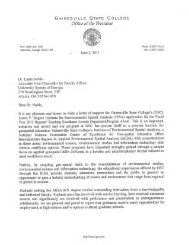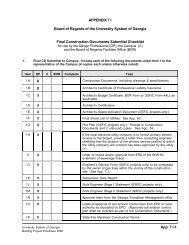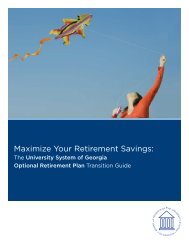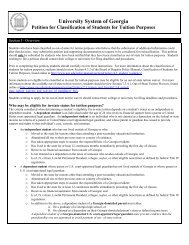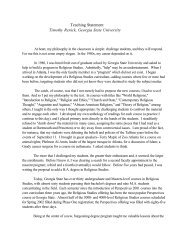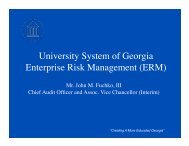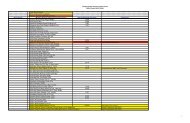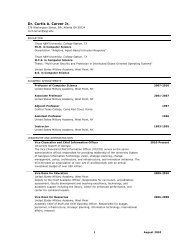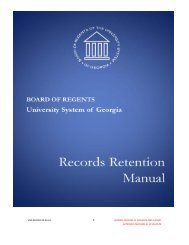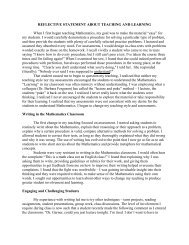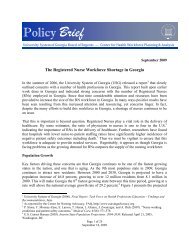WReier-Aviles on DSKGBLS3C1PROD with RULES266888 Federal Register / Vol. 75, No. 209 / Friday, October 29, 2010 / Rules and Regulationsissues such as foreign postsecondaryschools, defunct schools, and missingrecords.Finally, some commenters asked whatwe would consider acceptabledocumentation when a high school doesnot appear in the <strong>Department</strong>’s database<strong>of</strong> acceptable high schools.Discussion: As noted earlier in thispreamble, we are not delaying theeffective date <strong>of</strong> § 668.16(p). We believeit is an important new provision thatcan be implemented for the 2011–2012year on the basis we describe in thispreamble.To emphasize a point earlier in thispreamble, a school’s inclusion on thelist on FAFSA on the Web does notmean that it is exempt from possiblereview by an institution. Acceptabledocumentation for a review can includea high school diploma and a finaltranscript that shows all the courses thestudent completed.Changes: None.Comment: One commenter requestedthat the high school diploma validationrequired under § 668.16(p) apply only toundergraduates. Others asked forinstitutions to be able to waive diplomavalidation for students who aresubstantially older than traditionalcollege age and for students whose highschool no longer exists or cannot bereadily identified.Discussion: For 2011–2012, the<strong>Department</strong> will only ask first-yearundergraduate students to provide onFAFSA on the Web information aboutthe high school they graduated from.However, § 668.16(p) requiresinstitutions to review any high schooldiploma if the institution or theSecretary has reason to believe thediploma is not valid. In those instancesthe institution must evaluate thevalidity <strong>of</strong> the student’s high schoolcompletion whether the diploma wasobtained by an undergraduate or otherstudent and regardless <strong>of</strong> whether thestudent’s high school no longer exists oris not easily identified. We do notbelieve it is appropriate to limit thisrequirement to only undergraduatestudents or those whose high schoolsare not easily identified because thestudent eligibility requirement to have ahigh school diploma or its recognizedequivalent or to meet an alternativestandard applies to all students.Changes: None.Comment: Several commentersexpressed concern about the difficulty<strong>of</strong> validating high schools, not only forolder students, but also for studentswho graduated from a high school in adifferent part <strong>of</strong> the country, or inanother country. One commentersuggested that the <strong>Department</strong> permitinstitutions to use copies <strong>of</strong> foreignsecondary school credentials,attestations, and pro<strong>of</strong> <strong>of</strong> entry into theUnited States after the age <strong>of</strong>compulsory attendance, whenevaluating the secondary schooleducation <strong>of</strong> foreign-born students.Another commenter stated that manyadmissions <strong>of</strong>fices use the ‘‘credentialscore’’ for foreign countries instead <strong>of</strong>the name <strong>of</strong> the school, and that the<strong>Department</strong> should give guidance onhow institutions can use that score toevaluate diplomas from foreign schools.A couple <strong>of</strong> commenters expressedconcern that under proposed § 668.16(p)students who went to foreign schoolswould be adversely affected andpossibly denied access to postsecondaryeducation.Discussion: An institution mayconsider various kinds <strong>of</strong>documentation when developing itsprocedures for evaluating the validity <strong>of</strong>a student’s high school diploma. Forexample, there are companies thatprovide services for determining thevalidity <strong>of</strong> foreign secondary schooldiplomas; documentation from suchcompanies can inform an institution’sdiploma evaluation.Changes: None.Comment: A couple <strong>of</strong> commentersasked if there will be an appeal processfor students if an institution determinesthat their high school diploma isinvalid. Others observed that differentinstitutions may decide differentlyabout a given high school’s diploma andasked whether the <strong>Department</strong> will bethe final arbiter in these situations.Discussion: The regulations do notprovide for an appeal process forstudents if an institution determinestheir high school diploma is invalid.The <strong>Department</strong> considers institutionsto be our agents in administering thetitle IV, HEA programs and to have finalauthority in many decisions.Consequently, we do not generally haveappeal processes in place forinstitutional determinations <strong>of</strong> studenteligibility. Moreover, the <strong>Department</strong>will not intervene in cases where a highschool diploma is deemed valid at oneinstitution but not another.Changes: None.Comment: Several commenters askedwhat the effect <strong>of</strong> proposed § 668.16(p)would be on homeschooling, and somecommenters noted that a home schoolcredential is different from a highschool diploma and asked that the<strong>Department</strong> emphasize this difference.Others asked that we provide guidanceon State-granted credentials forhomeschoolers and best practices forverifying home school credentials. Oneorganization asked that theVerDate Mar2010 14:10 Oct 28, 2010 Jkt 223001 PO 00000 Frm 00058 Fmt 4701 Sfmt 4700 E:\FR\FM\29OCR2.SGM 29OCR2achievements <strong>of</strong> homeschoolers not beignored, and that the proposedregulations and any related FAFSAchanges recognize that graduates <strong>of</strong>home schools receive a diploma fromtheir program.Finally, one commenter questionedwhy the <strong>Department</strong> is so interested inthe quality <strong>of</strong> a high school diploma(which is not defined in the HEA or the<strong>Department</strong>’s regulations) whenhomeschooled students are taught bytheir parents, who (typically) lackcredentials and curriculum standards.Discussion: Section 668.16(p) doesnot apply to homeschooled students.For guidance pertaining tohomeschooled students, please seeChapter 1 <strong>of</strong> Volume 1 <strong>of</strong> the FederalStudent Aid Handbook.Changes: None.Comment: Many commenters asked ifthere would be, or suggested that thereshould be, a mechanism for schools andState and local agencies, accreditingbodies, and education departments tosuggest schools that should be added toany acceptable and unacceptable liststhat the <strong>Department</strong> develops inconnection with § 668.16(p). Onecommenter requested that when we askStates to provide lists <strong>of</strong> approvedschools, they provide all high schoolsand not just public high schools, whichthe commenter noted fall under moreState oversight. Another commenterrecommended referring to the CollegeEntrance Examination Board (CEEB)code for high schools to determinewhether those are acceptable, andanother suggested consulting theCollege Board and the <strong>Department</strong> <strong>of</strong>Defense to help build the list <strong>of</strong>acceptable high schools. A fewcommenters asked what will happenwhen an institution evaluates a diplomafrom a school not on the <strong>Department</strong>’slist <strong>of</strong> acceptable high schools and findsthat the school is acceptable. Thecommenter wondered if this will meanthat institutions will have their ownlists <strong>of</strong> acceptable schools separate fromthe <strong>Department</strong>’s.Discussion: As noted earlier in thispreamble, we intend to use informationfrom NCES to create a drop-down list inFAFSA on the Web populated by thenames <strong>of</strong> public and private highschools that NCES provides to us.Neither inclusion on the list norexclusion from it is an indication <strong>of</strong>whether a high school will need to bereviewed by a postsecondary institutionunder § 668.16(p).There is a procedure by which privateschools may submit their name forinclusion on the private school list.<strong>Postsecondary</strong> institutions are not
Federal Register / Vol. 75, No. 209 / Friday, October 29, 2010 / Rules and Regulations66889WReier-Aviles on DSKGBLS3C1PROD with RULES2responsible for submitting the names <strong>of</strong>secondary schools.Changes: None.Comment: A couple <strong>of</strong> commentersdistinguished between a high schooldiploma and a transcript, and suggestedthat a transcript is more valuable forinstitutions to use to determine thevalidity <strong>of</strong> the student’s high schoolcompletion. Another commenter notedthat transcripts and diplomas are notinterchangeable and that the<strong>Department</strong> should clarify this.Discussion: We agree that a highschool transcript is not the same as adiploma. It is the latter that is requiredunder the student eligibility regulationsand the statute, not the former. Atranscript may be a valuable tool indetermining whether a high schooldiploma is valid because by listing thecourses the student completed, itdemonstrates the extent <strong>of</strong> his or hersecondary school education.Changes: None.Comment: One commenter seemed tothink that an institution would submitdocumentation to the <strong>Department</strong> forreview if a student was chosen forverification due to not answering theFAFSA questions about his or her highschool diploma.Discussion: The <strong>Department</strong> does notplan to require institutions to submitindividuals’ high school documentationfor validation. Moreover, the<strong>Department</strong> does not intend to selectapplicants for verification just becausethey did not complete the high schooldiploma questions on the FAFSA.Changes: None.Comment: A few commenterssuggested that institutions should not beconsidered to have reason to believethat an applicant’s high school diplomais not valid or was not obtained from anentity that provides secondary schooleducation, unless the information fromFAFSA processing suggests that. Thesecommenters argued that institutionsshould not be obligated to investigatewhether every applicant’s high schooldiploma is valid, nor should theinstitution be required, if it is aninstitution that collects diplomainformation as part <strong>of</strong> the admissionsprocess, to cross-check that informationagainst the information from the FAFSAbecause that would be too burdensome.Discussion: For the 2011–2012 awardyear, we will not provide any additionalhigh school diploma information on theInstitutional Student InformationRecord (ISIR) beyond what the studentsubmitted on the FAFSA. We will notexpect institutions to check the ISIRhigh school data for every studentagainst other information obtained bythe institution during the admissionsprocess. However, if an institution hasreason to believe (or the Secretaryindicates) that a high school diploma isnot valid, the institution must follow itsprocedures to evaluate the validity <strong>of</strong>the diploma.Changes: None.Comment: One commenter requestedthat the <strong>Department</strong> declare that§ 668.16(p) will not be retroactive.Discussion: This requirement willapply to institutions beginning on July1, 2011, the effective date for theseregulations. This means that institutionswill be required to follow theprocedures developed under § 668.16(p)for any applicant who completes aFAFSA beginning with the 2011–2012award year.Changes: None.Comment: Several commentersrequested that we allow FAAs to foregodiploma validation for students whohave completed six credits <strong>of</strong> collegecoursework that applies to a program <strong>of</strong>study at the institution or if thestudent’s ability to be admitted to theinstitution or eligibility for title IV, HEAaid is otherwise not affected.Discussion: It is correct that a studentwithout a high school diploma would beeligible for title IV, HEA aid if he or shemeets one <strong>of</strong> the other academic criteria,such as successfully completing sixcredits or 225 clock hours <strong>of</strong> collegelevelcoursework that apply to aprogram at the current institution.However, because students have thatflexibility does not obviate therequirement that for an institution to beeligible, it must admit as regularstudents only those with a high schooldiploma, or the recognized equivalent,or who are beyond the age <strong>of</strong>compulsory school attendance.Changes: None.Comment: One commenter asked thatif the <strong>Department</strong> permits waivers to therequirement in § 668.16(p) to followprocedures to check the validity <strong>of</strong> ahigh school diploma, that institutions,in particular those that do not admitstudents without a diploma or theequivalent, be permitted to evaluate thevalidity <strong>of</strong> a diploma if they choose.Discussion: There will be no waivers<strong>of</strong> the requirement that an institutionmust evaluate the validity <strong>of</strong> a highschool diploma when it or the Secretaryhas reason to believe that the diplomais not valid or was not obtained from aschool that provides secondary schooleducation.Changes: None.Comment: One commenter asked thatwe interpret section 123 <strong>of</strong> the HEA (20U.S.C. 1011l) to apply to high schooldiploma mills as well as collegediploma mills.VerDate Mar2010 14:10 Oct 28, 2010 Jkt 223001 PO 00000 Frm 00059 Fmt 4701 Sfmt 4700 E:\FR\FM\29OCR2.SGM 29OCR2Discussion: This section <strong>of</strong> the HEAprovides that the <strong>Department</strong> will,among other things, maintaininformation on its Web site to educatestudents, families, and employers aboutdiploma mills and that it willcollaborate with other Federal agenciesto broadly disseminate to the publicinformation on how to identify diplomamills. While section 105 <strong>of</strong> the HEA (20U.S.C. 1003) defines diploma mill onlyin terms <strong>of</strong> postsecondary education, weintend to examine the issue <strong>of</strong> highschool diploma mills further.Changes: None.Comment: One commenter urged the<strong>Department</strong>’s <strong>Office</strong> <strong>of</strong> InspectorGeneral to be actively engaged withother agencies in detecting fraud,especially given that high schooldiploma mills may adopt names <strong>of</strong>legitimate schools.Discussion: The <strong>Department</strong>’s <strong>Office</strong><strong>of</strong> Inspector General will continue towork with other agencies as appropriateto detect fraud in this area.Changes: None.Comment: One institution commentedthat it finds it difficult to explain tostudents who present questionable highschool credentials why those credentialsare not sufficient for receiving title IV,HEA aid.Discussion: In a situation such as this,we believe that it would be appropriatefor the institution to explain to studentsthe concept <strong>of</strong> a high school diplomamill, i.e., an entity that <strong>of</strong>fers acredential, typically for a fee, andrequires little or no academic work onthe part <strong>of</strong> the purchaser <strong>of</strong> thecredential. We believe that studentswith a credential from a diploma millwould not have a sufficient educationalfoundation for success at thepostsecondary level and should notreceive title IV, HEA aid.Changes: None.Comment: One commenter urged the<strong>Department</strong> to clarify that the diplomas<strong>of</strong> high schools that are not accreditedare not necessarily invalid under§ 668.16(p). Several commenters askedwhether a new high school that wasoperating but had not yet receivedaccreditation would be acceptable underthis regulation. A small private highschool expressed concern that the newprovision would hinder its studentsfrom going to college because it is notaccredited and this provision may bemisinterpreted to mean that nonaccreditedhigh schools are notacceptable. The school asked that wedisabuse the public <strong>of</strong> the mistakennotion that for students to receive titleIV, HEA aid, their high school diplomasmust be from accredited schools.
- Page 1 and 2:
Friday,October 29, 2010Part IIDepar
- Page 3 and 4:
Federal Register / Vol. 75, No. 209
- Page 6 and 7:
66836 Federal Register / Vol. 75, N
- Page 8 and 9: 66838 Federal Register / Vol. 75, N
- Page 10 and 11: WReier-Aviles on DSKGBLS3C1PROD wit
- Page 12 and 13: 66842 Federal Register / Vol. 75, N
- Page 14 and 15: 66844 Federal Register / Vol. 75, N
- Page 16 and 17: WReier-Aviles on DSKGBLS3C1PROD wit
- Page 18 and 19: 66848 Federal Register / Vol. 75, N
- Page 20 and 21: 66850 Federal Register / Vol. 75, N
- Page 22 and 23: WReier-Aviles on DSKGBLS3C1PROD wit
- Page 24 and 25: 66854 Federal Register / Vol. 75, N
- Page 26 and 27: WReier-Aviles on DSKGBLS3C1PROD wit
- Page 28 and 29: 66858 Federal Register / Vol. 75, N
- Page 30 and 31: 66860 Federal Register / Vol. 75, N
- Page 32 and 33: 66862 Federal Register / Vol. 75, N
- Page 34 and 35: 66864 Federal Register / Vol. 75, N
- Page 36 and 37: 66866 Federal Register / Vol. 75, N
- Page 38 and 39: WReier-Aviles on DSKGBLS3C1PROD wit
- Page 40 and 41: WReier-Aviles on DSKGBLS3C1PROD wit
- Page 42 and 43: 66872 Federal Register / Vol. 75, N
- Page 44 and 45: WReier-Aviles on DSKGBLS3C1PROD wit
- Page 46 and 47: WReier-Aviles on DSKGBLS3C1PROD wit
- Page 48 and 49: WReier-Aviles on DSKGBLS3C1PROD wit
- Page 50 and 51: 66880 Federal Register / Vol. 75, N
- Page 52 and 53: WReier-Aviles on DSKGBLS3C1PROD wit
- Page 54 and 55: 66884 Federal Register / Vol. 75, N
- Page 56 and 57: 66886 Federal Register / Vol. 75, N
- Page 60 and 61: WReier-Aviles on DSKGBLS3C1PROD wit
- Page 62 and 63: WReier-Aviles on DSKGBLS3C1PROD wit
- Page 64 and 65: WReier-Aviles on DSKGBLS3C1PROD wit
- Page 66 and 67: WReier-Aviles on DSKGBLS3C1PROD wit
- Page 68 and 69: WReier-Aviles on DSKGBLS3C1PROD wit
- Page 70 and 71: WReier-Aviles on DSKGBLS3C1PROD wit
- Page 72 and 73: 66902 Federal Register / Vol. 75, N
- Page 74 and 75: WReier-Aviles on DSKGBLS3C1PROD wit
- Page 76 and 77: WReier-Aviles on DSKGBLS3C1PROD wit
- Page 78 and 79: 66908 Federal Register / Vol. 75, N
- Page 80 and 81: WReier-Aviles on DSKGBLS3C1PROD wit
- Page 82 and 83: 66912 Federal Register / Vol. 75, N
- Page 84 and 85: WReier-Aviles on DSKGBLS3C1PROD wit
- Page 86 and 87: 66916 Federal Register / Vol. 75, N
- Page 88 and 89: WReier-Aviles on DSKGBLS3C1PROD wit
- Page 90 and 91: WReier-Aviles on DSKGBLS3C1PROD wit
- Page 92 and 93: WReier-Aviles on DSKGBLS3C1PROD wit
- Page 94 and 95: 66924 Federal Register / Vol. 75, N
- Page 96 and 97: WReier-Aviles on DSKGBLS3C1PROD wit
- Page 98 and 99: 66928 Federal Register / Vol. 75, N
- Page 100 and 101: WReier-Aviles on DSKGBLS3C1PROD wit
- Page 102 and 103: 66932 Federal Register / Vol. 75, N
- Page 104 and 105: WReier-Aviles on DSKGBLS3C1PROD wit
- Page 106 and 107: 66936 Federal Register / Vol. 75, N
- Page 108 and 109:
66938 Federal Register / Vol. 75, N
- Page 110 and 111:
66940 Federal Register / Vol. 75, N
- Page 112 and 113:
66942 Federal Register / Vol. 75, N
- Page 114 and 115:
66944 Federal Register / Vol. 75, N
- Page 116 and 117:
66946 Federal Register / Vol. 75, N
- Page 118 and 119:
WReier-Aviles on DSKGBLS3C1PROD wit
- Page 120 and 121:
WReier-Aviles on DSKGBLS3C1PROD wit
- Page 122 and 123:
WReier-Aviles on DSKGBLS3C1PROD wit
- Page 124 and 125:
66954 Federal Register / Vol. 75, N
- Page 126 and 127:
WReier-Aviles on DSKGBLS3C1PROD wit
- Page 128 and 129:
66958 Federal Register / Vol. 75, N
- Page 130 and 131:
66960 Federal Register / Vol. 75, N
- Page 132 and 133:
WReier-Aviles on DSKGBLS3C1PROD wit
- Page 134 and 135:
WReier-Aviles on DSKGBLS3C1PROD wit
- Page 136 and 137:
WReier-Aviles on DSKGBLS3C1PROD wit
- Page 138 and 139:
66968 Federal Register / Vol. 75, N
- Page 140 and 141:
66970 Federal Register / Vol. 75, N
- Page 142 and 143:
66972 Federal Register / Vol. 75, N
- Page 144 and 145:
66974 Federal Register / Vol. 75, N



